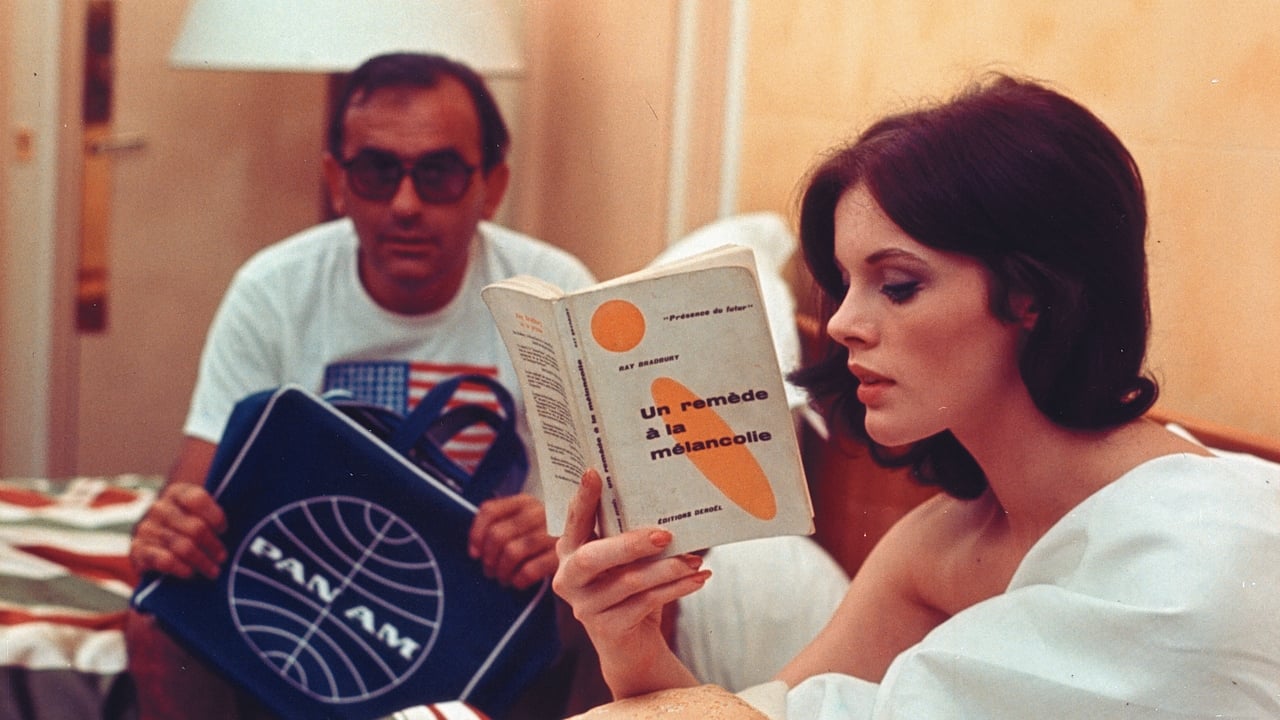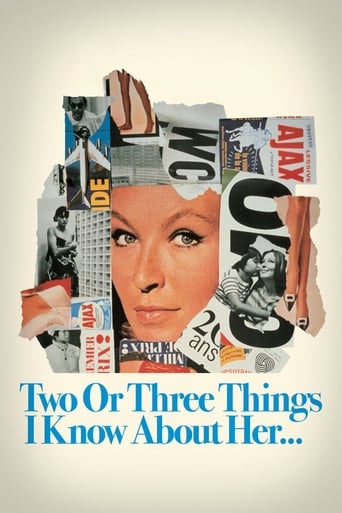

Jean-Luc Godard is a master of making nonsense turn into something interesting, something of deep meaning. 2 or 3 Things I Know About Her is full of grand ideas, jumbled up no less, and in return they make a sometimes compelling and sometimes frustrating film. Godard famously once said that the film was supposed to be an homage to The Big Sleep, but instead of a detective, the main character is a prostitute. But if 2 or 3 Things I Know About Her is an homage to The Big Sleep, then I must be a zebra. Frankly, no matter what Godard tries to tell us beforehand, this is a challenging film that has moments of great intellect and inspiration.The "her" in the title refers both to Marina Vlady and the city of Paris itself. Vlady "portrays" Juliette Janson, a bourgeois housewife that doubles as a prostitute in order to pay the bills. "Portrayal" has quote marks around it as Juliette is less of a character and more of a representation: Godard does not intend to tell the story of the complicated woman — he would prefer to study the changing climate of 1960s Paris and its people. 2 or 3 Things I Know About Her marks a huge shift in Godard's career. A staggering fan of American cinema, his earlier projects, such as Pierrot Le Fou and A Woman Is A Woman, were genre films that were stylized as crime thrillers and Technicolor musicals, respectively. But 2 or 3 Things shows Godard more interested in politics and how the increasingly radical ideas of the world were shaping Europe. There are still very American things that show up in certain scenes: in the opening credits, the font is dressed in red, white, and blue. In the rest of the film, advertisements that surround the characters are designed with art deco boldness. But it's difficult to compare the film to anything the U.S. had to offer in cinemas in 1967.2 or 3 Things I Know About Her feels like a delve into Godard's brain at the time. The Vietnam War is mentioned frequently, serving not only as a point of critique but also as a pressing matter, always on the mind. Juliette's immoral lifestyle choice is not a plot device, but a reflection of 1967 France: President Charles de Gaulle's bold transformations to the economic system are prevalent. Skyscrapers are gazed upon with an alienated distance, and Juliette's work was an actual choice many women had to make as cost of living began to increase under his rule.Godard's positions are fascinating, but at times they begin to ramble and become disjointed in their aesthetic. 2 or 3 Things I Know About Her is at its most exciting when characters are simply having normal conversations. When they deliver fourth-wall breaking monologues, they lose quite a bit of their charisma as they feel as though Godard is talking to himself. Too much Godard can be too much Godard, after all.2 or 3 Things I Know About Her features more successes than failures; it's a film that doesn't have much emotional relevance but manages to create interest on a philosophical level. Godard had a great '60s, and this is a fitting closing.Read more reviews at petersonreviews.com
... View MoreThis is a film collage, or experimental film, about the state of Paris as Godard sees it in 1967. The old, romantic Paris is reshaped, large suburbs of tower blocks are built, which Godard correctly predicted to be soulless and inhuman to some degree. The film loosely follows the life of a young housewife and depicts her consumerist lifestyle, which Godard likens to prostitution. At one point she and her manicurist prostitute themselves to a US-American, who wears a stars-and-stripes-T-shirt and makes the girls wear bags over their head. The narrative is so weak that I had to look it up on the internet. Unfortunately, Godard doesn't limit himself to depicting the state of life in 1967, which could have made a fascinating cinematic time capsule. In a way, he seems to be p*ssed off with the state of things in general. Les banlieues -- bad. Vietnam war -- bad. Bright boxes of soap powder -- bad. Cinematic conventions and storytelling -- bad. It's like watching the rant of a miserable old man. I thought the analogy between capitalism and prostitution was pretty cheap. Prefab tower blocks were going up in the Eastern bloc like mushrooms. What alternative does he have to offer? Is he just hankering for the old days of "gay Paree"? As if prostitution hadn't existed back then. In a way, he's part of the parcel. People in 1967 were moving into high-rise slabs, surrounded themselves with bright plastic, and had to endure soulless movies like this one.Yet I'm not angry with Godard. He tried new stuff in this movie, and wasn't very successful with it. I'm angry with film critics who make this out to be a cinematic masterpiece merely because it's "political".
... View More"I had a dream last night, you know. I was walking all alone at the edge of a cliff. The path was only wide enough for one person. Suddenly I saw two twins walking toward me. I wondered how they would get past. Suddenly one of the twins went towards the other and they became one person. And then I realized that these two people were North and South Vietnam being united." -- Christophe, Juliette's young sonIn the opening moments of the film, Godard introduces us--with his famous whispering narration--to Marina Vlady, the actress who will play our protagonist "in a few frames," to paraphrase. He repeats what he says, only a few frames later, this time introducing her as Juliette. This is what cinema is. A movie that isn't completely self-conscious, is little more than a book on film. In addition to Godard's ramblings on such topics as Vietnam, Paris life, and philosophy, Juliette often thinks outloud, speaking directly to the audience, while looking at the camera. We even get the privilege to experience her thoughts first-hand a few times."Her," is not Juliette nor Paris, as some theories state, but the cinema. In fact, we learn very little about Juliette or about Paris, as they are both lost behind ridiculous questions with no answers and the result of these questions. Commercialism is a mask for some people, and many scenes suggest lifestyle is becoming more important than life. The final shot of the film shows many household products--such as Tide--scattered in a field. Godard is say we must live together with each other and these objects--as they are all together in the field--which, as he states, sadly live on longer than we do. The more primitive we are, the happier we become, but we are to conditioned to use them, so we must make a compromise on both sides.But what are the two or three things Godard knows about cinema? Everything there is to know about this young artform. Future filmmakers must take a work of art like this and figure out everything else, because right now we only know two or three things about it.Discuss the film and others at:http://moviefan.proboards20.com
... View MoreGodard rejects his `all you need to make a film is a girl and a gun' theory in Two or Three Thing I Know About Her. The 'her' refers to Paris rather than the female protagonist and the only gun apparent is a toy that belongs to her son. The inspiration for the film came from an article on housewife prostitution. Godard consequently examined his theory that to live in Paris (in 1966) one had to prostitute oneself to survive. The narrative is shot through the eyes of Juliette (Marina Vlady), a Parisian housewife. She prostitutes herself weekly in the vain hope that she will be able to buy happiness and escape the high rise Parisian suburb where she lives with her husband and young son. Two or Three Things I Know About Her is a skillfully composed visual essay. It is an astounding collage of images that acknowledges the transformation of modern society into a technological monstrosity. As the principal strength of the French New Wave, Godard created a masterpiece that comes across as revolutionary and modernist over thirty years subsequent to its conception.
... View More